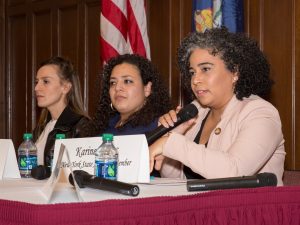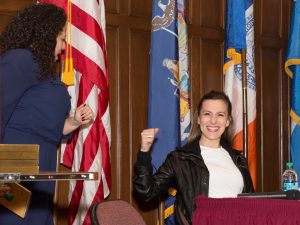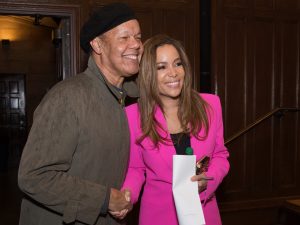“We’re gathered to celebrate the women who made the county what it is—they who lived with faith and worked with hope and made love a reality here in the borough, [even]when they did not believe in the borough,” Joseph M. McShane, S.J., president of Fordham, said to a crowd of more than 100 in Keating Hall. “They took to heart the motto of the Bronx: Ne cede malis. Never give in to evil.”
The event, hosted by the Bronx Borough President’s Office, featured five women from different walks of life: Alessandra Biaggi, LAW ’12, New York state senator; Nathalia Fernandez, assemblywoman for the 80th District; Karines Reyes, assemblywoman for the 87th District; Sunny Hostin, ABC News senior legal correspondent and co-host of The View who moderated the panel discussion; and Deputy Bronx Borough President Marricka Scott-McFadden, who served as emcee of the night.
What they all have in common are their ties to the Bronx. Hostin was born and bred in the South Bronx. Biaggi, whose senatorial district includes portions of the Bronx, is the granddaughter of Italian immigrants who lived in Hunts Point. Fernandez’s father and mother immigrated to the Bronx from their native Cuba and Columbia, respectively. And although Reyes and Scott-McFadden aren’t Bronx natives, they have made the borough their home.
“I am originally from Georgia. I wasn’t lucky enough to be born in the Bronx,” Scott-McFadden said to laughter from the audience.
A Woman’s Perspective in Politics
The panel spoke about the need for women legislators who can vouch for the importance of women’s reproductive health, universal childcare, and reducing maternal mortality in New York state.
“When I hear men stand up and matter-of-factly talk about a woman’s body and how things happen in operating rooms that don’t really happen—because I’ve been in operating rooms; it’s my profession—and hear all these people that don’t have a medical background sway how legislation affects us … it’s scary,” said Reyes, who’s worked as a registered nurse in Montefiore Medical Center’s oncology ward. “It’s important to have more women at the table. But [also]more professionals with different backgrounds.”

Another issue that women face is a lack of childcare, said Biaggi. Although today’s U.S. mothers are spending more time in the workforce than in the ’60s, they’re also spending more time on childcare.
“What we would like to see—and this is why our voices are so important and why it’s so important that we’re in the room—is childcare everywhere,” Biaggi said. “When you have children, they don’t disappear just because you’ve gone to work.” A few women in the audience expressed their agreement.
The panelists also discussed a disturbing trend affecting mothers in New York state—the rising rate of deaths in the delivery room. The rate of maternal deaths in the state rose from 13.2 per 100,000 live births in 2006 to 25 per 100,000 live births in 2015.
“The women who are dying in this state … they’re educated. They’re lawyers, they’re doctors, they’re teachers, they’re nurses. They’re literally your neighbors, and they’re dying at higher rates than they’ve ever died before,” Biaggi said. “And the women who are mainly dying are women of color.”
“It happened to Serena Williams,” Hostin chimed in. “She almost died because they [the doctors]weren’t listening to her.”
“And it’s Serena Williams. Like … what? How can this be?” Biaggi said, searching the eyes of the audience. “We have a real problem with women’s voices [not]being heard.”
A Personal Fight for Equal Pay
The five women also discussed the gender pay gap in the U.S. On average, female workers earned around 80 cents for every dollar a man made in 2018.
Hostin recalled the day she was signed onto The View. When she received her deal sheet from her male agent, she was ecstatic. “When I say I’m a kid from the South Bronx projects … I had never seen money like that,” she said. “I was dancing around.”

Then her cell phone buzzed. It was Sherri Shepherd, a previous co-host on The View. Shepherd revealed to Hostin her personal pay history from a decade ago. It turned out, said Hostin, that Shepherd was offered more money than her successor.
“[It’s only because] she opened up and shared with me her deal history and her salary that I now have the deal that I have,” said Hostin, who renegotiated her deal sheet with her agent. “And I shared that deal with everybody that came after me.”
It was a lesson Fernandez could relate to. She remembered working in a team where she was the only woman. Two months into the job, she discovered she was making less than all her male colleagues. She was told she was paid less because she was a new employee. But eventually, she said, she received a pay raise to match the men’s salaries.
Speak up when you see discrepancies, Fernandez said—be brave enough to demand your worth.
Leaving a Legacy in the Bronx
At the end of the night, Bronx Borough President Ruben Diaz Jr. presented each panelist with a citation of merit and thanked them for their service to the Bronx community. He asked the audience to give a round of applause for the women who work with him every day. And, in a candid speech, he spoke about the women who have shaped him into who he is today.
Diaz Jr. grew up in a maternal community of abuelitas and mothers in the Bronx, whom he called “the force of the household.” Eventually, he met a woman who became his wife, Hilda Gerena Diaz—the person who became the family breadwinner while he ran for office.

“Even though I lost that first race, she’s the one who paid the bills in our house,” he said to thunderous applause and whistles from the crowd.
He added that the Bronx—home to more women than men—is also the birthplace of women like Jennifer Lopez, Grammy Award-winning rapper Cardi B, and U.S. Supreme Court Justice Sonia Sotomayor.
“In this borough, when you give a woman the opportunity, she will conquer her craft,” Diaz Jr. said. “And she will conquer the world.”

